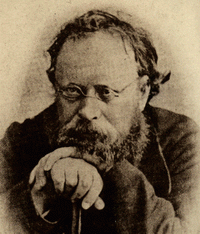 French writer and political theorist, sometimes referred to as the father of modern anarchism.
French writer and political theorist, sometimes referred to as the father of modern anarchism.
Pierre-Joseph Proudhon was born in Besançon on January 15, 1809.
Proudhon is a rarity among anarchist philosophers in that he was of quite humble peasant origins. He began his working life herding cows and doing chores at home. His mother, Catherine Simonin, was determined that he get some education, however, and when the family moved into town in 1820 arrangements were made to enroll him in a school. The fees were waived through his father’s employer’s connections. Still without sufficient funds, he was routinely punished at school for “forgetting” the books he could not afford to buy. Although he intended to go on to study for a baccalaureate, family financial difficulties prevented him from pursuing a higher degree upon graduation and he turned his talents instead to the printer’s trade, a profession which gave birth to many anarchists, but the first to call himself an anarchist was Proudhon.
In his pamphlet What Is Property?, Proudhon condemned the abuses of concentrated economic power and private property. His radical theories made him popular as an anarchist thinker, and he was elected to the constituent assembly after the Revolution of 1848. In the assembly, his proposal to levy antiproperty tax on rent and interest was defeated. He also attempted to found a people’s bank at which credit would be provided to borrowers without interest.
Proudhon opposed the view of the French utopian socialists François Fourier and Claude Rouvroy, Comte de Saint-Simon, on the ground that society could not be transformed in accordance with a preconceived plan. He envisioned a society in which people’s ethical nature and sense of moral responsibility would be so highly developed that government would be unnecessary to regulate and protect society. Proudhon rejected the use of force to impose any system on people. In the ideal state of society, what he called order in anarchy, people would act in a responsible, ethical manner of their own free will.
By mid-century, Proudhon was the leading left intellectual in France or for that matter, all of Europe, far surpassing Karl Marx‘s notoriety or Michael Bakunin’s. Proudhon, as Hyams noted (1979, p. 1), was among the inventors of socialism, along wih Karl Marx, Michael Bakunin, Louis Auguste Blanqui, Louis Blanc, Alexandr Herzen, Ferdinand Lassalle and Friedrich Engels. Of these, Proudhon had the profoundest effect upon the workers’ movement in the 19th century and his ideas influenced some of the most notable later anarchists, including both Tolstoy and Bakunin, both of whom knew Proudhon personally.
Proudhon was imprisoned from 1849 to 1852 for criticizing Louis Napoleon. After his release he lived in exile in Belgium. After being pardoned (1862), he returned to France in broken health and died on January 19, 1865.
The main themes of Proudhon’s thought were constant throughout most of his work. He criticized political revolutions from above, clearly identifying the darker side of the socialist vision to which revolutionaries in the Marxist tradition have succumbed. Centralized government, organized for whatever purpose, is an evil to be countered by a decentralized, mutualist economy. The federalist theme which runs through his work was designed to counter the centralization of the developing nation states. It was a federalism far different from the federalism pursued in the United States or Switzerland. It was a federalism in which real power resided at the local level, rather than being “devolved” from on high. Finally, he clearly identified the working class as an autonomous revolutionary force which would eventually win its own freedom.
Major works of Pierre Joseph Proudhon
– What is Property?, 1840
– System of Economical Contradictions or The Philosophy of Misery, 1846
– Letters to Bastiat on Principal and Interest, 1849 – Letter 1-2-3-4
– General Idea of the Revolution in the Nineteenth Century, 1851

I enjoy what you guys tend to be up too. This type of clever work and coverage! Keep up the superb works guys I’ve you guys to my blogroll.